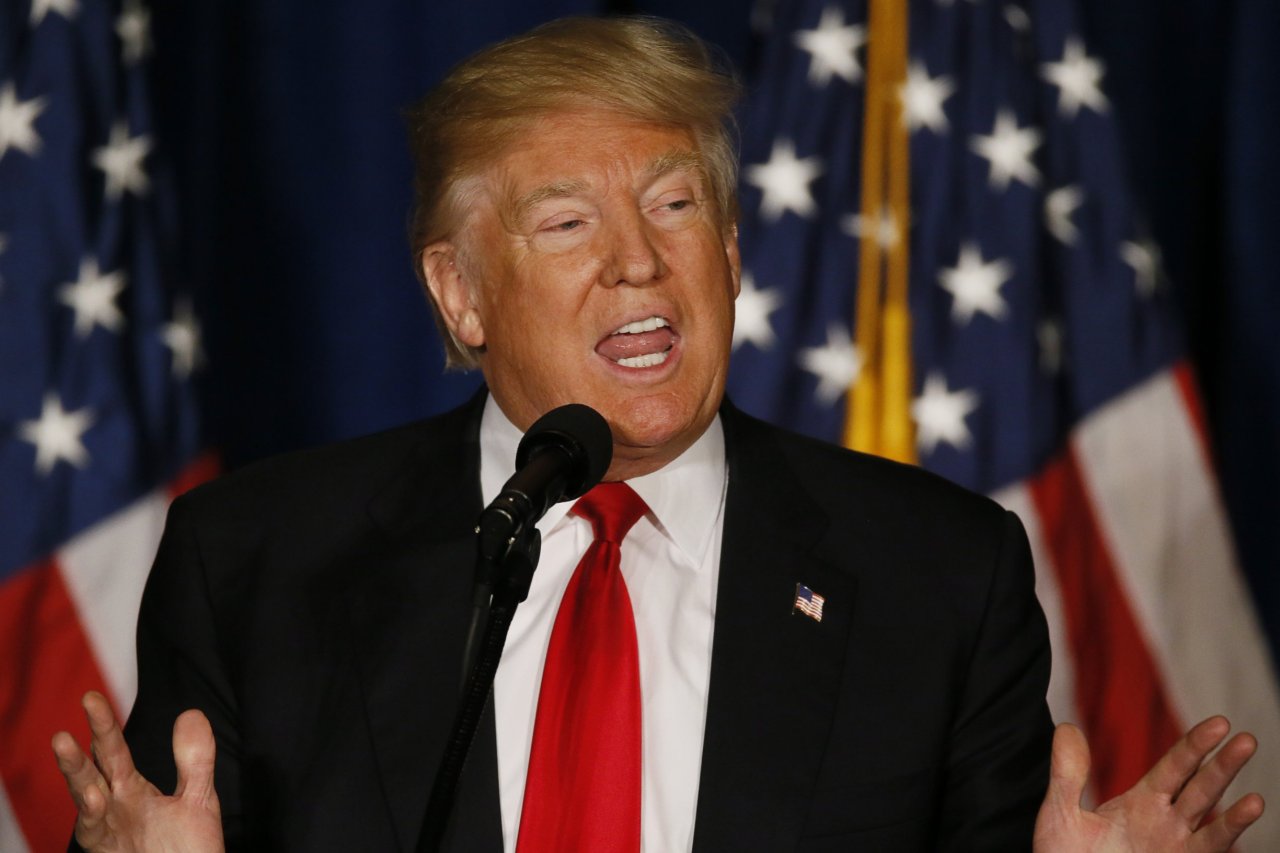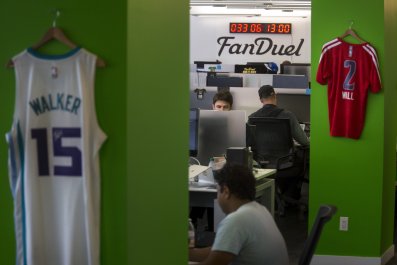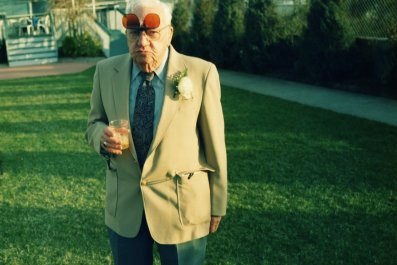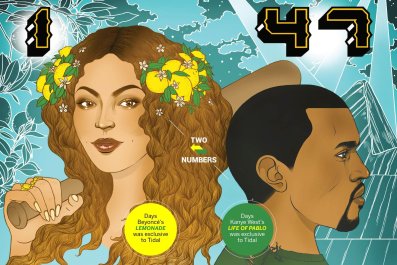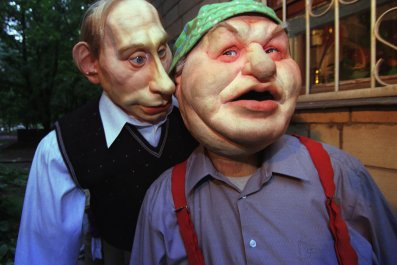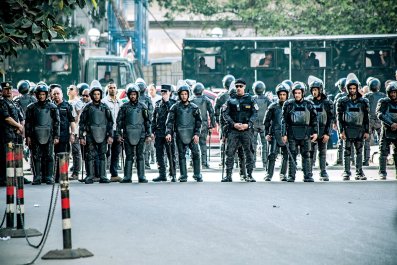Donald Trump should be a nominee for president this fall. And Bernie Sanders should not.
This is not a judgment on the merits of any candidate, political philosophy or policy position. Instead, it is about a principle that supposedly is a source of pride for Americans but that too many citizens hold in contempt: democracy.
In the past few decades, democracy has become seen as an impediment to those in power, where voters get in the way of the "correct" outcomes. The will of the electorate is treated with scorn, something to push aside for the greater goal of getting into office. Voter suppression, rules manipulation and dirty tricks intended to mislead certain constituents have become workaday realities of the American electoral system. The United States now ranks 20th in the world in the quality of its democracy, according to the Economist Intelligence Unit, behind Uruguay and down from 17th in 2007. Politicians and party leaders across the board seem to have the mindset attributed to the Argentine demagogue Juan Perón in the musical Evita, when his character sings, "It's annoying that we have to fight elections for our cause, the inconvenience—having to get a majority."
In the 2016 U.S. presidential race, that Perónist disdain for the electorate is on display with the outlandish attempts by some Republicans to stop Trump and by some Democrats to crown Sanders.
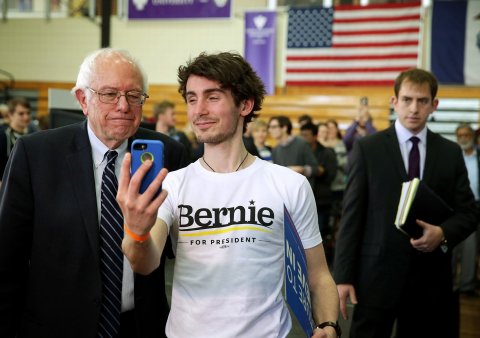
As Trump continues to sweep up millions of votes, Republican Party leaders are scrambling to find a way to ignore them. Because many candidates were in the race when it started, it is possible Trump won't have enough delegates to secure the nomination on the first ballot at the Republican Convention. No doubt, if his last name was Bush or Rubio or Romney, this would be inconsequential—rather than cooking up ways for someone else to get the nod, party leaders would sweet-talk or arm-twist unpledged delegates to coalesce around the front-runner. But Republican politicians and party bosses fear that a Trump nomination could lead to the biggest electoral washout in history and so are scheming to overrule the riffraff.
Meanwhile, Sanders supporters and campaign strategists are publicly discussing ways to snatch the nomination away from Hillary Clinton, even if she wins the most votes and gets enough delegates to claim the nomination. This strategy has a probability of success tinier than the period at the end of this sentence. However, the basic idea is that, even if more voters cast their ballots for Clinton, Sanders could use the nomination rules to overrule them. The circumstances that raise this possibility are far more complicated than need be explained here, but it all comes down to the rules relating to pledged delegates, unpledged delegates and what are known as superdelegates, who are essentially Democratic officeholders and party leaders. The 712 superdelegates are not bound to vote for the candidate to whom they publicly declared their support (as of this writing, 519 have pledged to Clinton and 39 to Sanders). While Sanders and his supporters previously railed against the superdelegate system as undemocratic, they are now suggesting they might try to flip those delegates to the Vermont senator's side, even if he loses the popular vote.
The best advice to both sides? Knock it off. Yes, it can be disappointing to discover that the electorate doesn't share your opinion. Yes, it is always possible to bend and stretch and manipulate rules based on the belief that you know better than voters what's good for them. And yes, maybe some other candidate would be stronger in the general election than the one primary voters are selecting now.
Who cares? Nothing could be more destructive to both parties than overriding the expressed will of the electorate. Americans need to take a deep breath and start trusting democracy. If the majority of Americans who vote decide they want to be led by Trump or Cruz or Clinton or Sanders, so be it. If some in the electorate have temper tantrums and don't cast a ballot this fall because their candidate didn't win the most votes during the primary season, too bad—they will have chosen to let others decide the future of the country. Democracy is not complicated: Whoever gets the most votes is supposed to win. That's it.
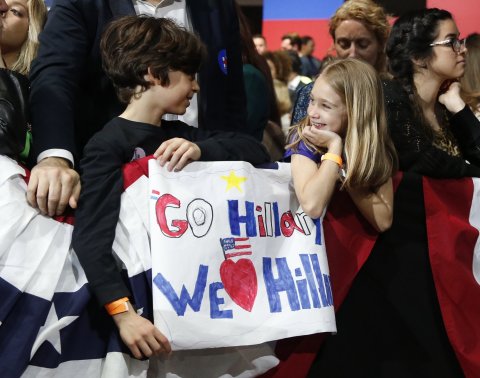
Unfortunately, conservatives have a long history of contempt for broad swaths of the electorate and have spent years finagling ways to make sure that only the "right" people gain easy access to the ballot box. During remarks in 1980 to a group called the Religious Roundtable, Paul Weyrich, a founder of the modern political conservative movement, made that quite clear. "I don't want everybody to vote,'' he said. "Our leverage in the elections quite candidly goes up as the voting populace goes down."
At times, politicians will admit that their machinations on voting rules are intended to keep certain types of people away from the polls. In 2013, for example, the then-attorney general in Texas and current governor of the state, Greg Abbott, said plainly in a court filing that redistricting plans were not targeting minority voters; instead, the rules "were designed to increase the Republican Party's electoral prospects at the expense of the Democrats." That just had an incidental impact on minority voters, he argued, not because they were minorities but because more minorities support Democrats. How convenient.
Some officials go even further, arguing that people who don't pay taxes shouldn't be allowed to vote and that college students should be impeded from voting. Matthew Vadum, a conservative columnist, wrote that registering the poor to vote was "like handing out burglary tools to criminals." In 2010, the founder of Tea Party Nation, Judson Phillips, praised the idea of allowing only landowners to vote. When a Tea Party congressman, Ted Yoho of Florida, mentioned that such landowning restrictions existed in early America, his audience burst into applause. He went on to suggest voting should be inconvenient because too many uninformed people cast ballots.
That type of thinking—arguing that those who disagree with you are dumb, irrational or corrupt—is the first step on the path that leads to democracy's destruction. Some liberals maintain that lower-middle-class people vote against their economic interests by siding with Republicans, without considering the possibility that social issues like banning abortion might matter more to them than their financial well-being. Some conservatives contend that people only support Democrats because they want government handouts, without considering the possibility that these voters believe in expanding individual rights for minorities or expanding access to the nation's health care system. College students don't know enough to vote intelligently, the elderly vote only for conservatives because of racism—the denigration goes on and on.
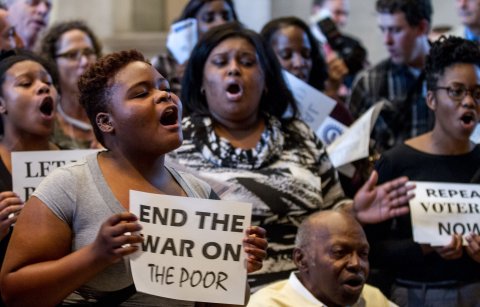
The next step: maintaining that your candidate is winning, regardless of the facts. In the last election, conservatives engaged in a surreal effort to "unskew" polls—essentially rejiggering them in ways they believed removed bias but that actually just extracted statistical requirements to create fictitious signs of victory for their presidential candidate, Mitt Romney. Political commentator Peggy Noonan famously dismissed poll results and predicted Romney would win, in part because she saw more yard signs for him in Florida. In this election, Sanders supporters have criticized those who now point out the mathematical near-impossibility of him winning the nomination, spinning scenarios of victory that are as credible as an unskewed poll.
The last and most destructive step: screaming fraud and manipulation. This is the logical outcome of the other steps. If no rational person would disagree with you, and your candidate was obviously winning (in your polls), then defeat could have come about only by rigged rules or crimes at the ballot box. When Sanders won several caucuses, Clinton supporters complained that, because that type of delegate selection lasts a long time and involves more than just casting a vote, the process was undemocratic. When Clinton won primaries in which only Democrats could vote, Sanders supporters complained that the system blocked independents from having a voice. In the aftermath of Clinton's near sweep of the Northeast primaries on April 26, actor Tim Robbins tweeted out a series of bogus numbers generated from that ever-reliable source—some anonymous guy on the internet—that supposedly "proved" Sanders lost because voting machines were rigged. After President Barack Obama won the general election in 2008, Public Policy Polling found that 52 percent of Republicans believed it was the result a massive conspiracy involving the Association of Community Organizations for Reform Now, a now-defunct organization that registered low-income people to vote. In 2012, PPP found that 49 percent of Republicans believed ACORN used fraud to get Obama re-elected—even though the organization closed its doors in 2010.
President George W. Bush won re-election in 2004 only through fraud in Ohio, liberals contended at the time. Obama snagged victory in the same state in 2012 by cheating, conservatives argued. When then-Senator Norm Coleman (R-Minn.) was at first declared the winner of his 2008 re-election campaign, with a margin of 215 votes over Democratic challenger Al Franken, conservative commentators demanded that Franken concede, while liberals raised allegations of fraud. When a recount reversed the results, conservatives cried about fraud while liberals called for Coleman to concede. In 2004, when Christine Gregoire, the Democratic candidate, won the governor's election in Washington state, Republicans, again, shrieked, "Fraud!" United States Attorney John McKay was dragged to the White House to explain why he had failed to bring indictments, even though conservative activists thought he should have. McKay said he would not drag innocent people in front of a grand jury; he was subsequently fired.
As a prominent Republican once said, members of his party don't believe they can be defeated without being cheated. It is an "article of religious faith that voter fraud is causing us to lose elections," Royal Masset, the former political director of the Texas Republican Party, said in 2007, adding that he doesn't believe that's true.
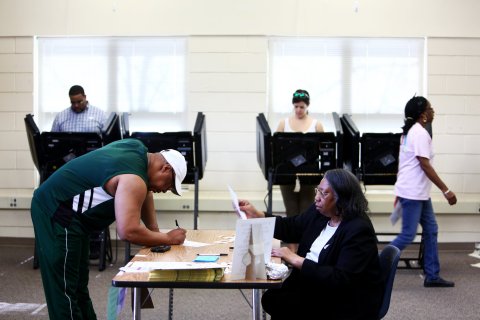
And that's because it's all horsefeathers. In her 2010 book, The Myth of Voter Fraud, Lorraine Minnite, a professor of public policy at Rutgers, collected decades of voting data and concluded that in 2005, more people had been indicted for violations of migratory bird laws than for election fraud. "Fraud itself is a relatively rare event,'' she wrote. "Rather, the problem is the myth of fraud that can influence the vote count and, more important, shapes the rules that erode voting rights."
That includes the big Republican bogeyman: the idea that millions of people—particularly aliens without documentation—are assuming other people's identities to illegally cast ballots. In normal times, this would be a laugh line. Think of it: The conspiracy-minded contend that individuals in this country are illegally risking discovery and deportation so they can cast a single vote, or that citizens are risking lengthy prison time to add one more ballot to the millions cast in their state, because…why? Studies that claim dead people voted or registered multiple times invariably turn out to be based on clerical errors or instances where someone voted, then died. A study by the Brennan Center for Justice at the New York University School of Law, which investigated hundreds of reports of alleged fraud in thousands of elections, found only a handful of alleged—much less proved—cases of in-person voter fraud. Instead, the reasons for the allegations were almost always benign, such as a dead man with the same name as a man who voted, or a name was written down incorrectly by a poll worker. In fact, almost every example that has been held up in recent years as proof of fraud tends to fall away as a misunderstanding or mistake when the details are examined.
A draft report about voter fraud written in 2006 by two consultants to the federal Election Assistance Commission found that "there is widespread but not unanimous agreement that there is little polling-place fraud, or at least much less than is claimed." (The final report toned down the language to a more politically palatable level, saying that the issue was a subject of "a great deal of debate.")
More important, if in-person voter impersonation is so rampant, where are the thousands or hundreds or dozens or 10 or five prosecutions for the crime each election cycle? Proclaiming they aren't discovered because the perpetrators are so clever is on par with saying that we know there are pink monkeys inside the Statue of Liberty but we can't prove it because they are such good hiders.
The truth is, the pink monkeys can't be found because they aren't there. "It is more likely that an individual will be struck by lightning than that he will impersonate another voter at the polls,'' Justin Levitt, now the deputy assistant attorney general in the Civil Rights Division of the U.S. Department of Justice, wrote in a 2007 report for the Brennan Center. "There have been a handful of substantiated cases of individual ineligible voters attempting to defraud the election system. But by any measure, voter fraud is extraordinarily rare."
To address this nonexistent problem, Republicans brought out a sledgehammer with "voter ID" laws that require people to produce specific types of identification at the ballot box. But even if the problem was real—which it isn't—the "solution" wouldn't solve it. Take Texas, which was at the forefront of pushing this tactic. In 2012, Forrest Mitchell, an investigator with the state attorney general's office, said in sworn testimony that only about five of the more than 300 investigations into election fraud in the previous decade had involved in-person voter fraud, and just two of those would have been prevented by an ID law. That means that out of more than 39 million votes cast during those years (not including primaries), cases where there was evidence of fraud that might have been stopped by voter ID occurred 0.0000005 percent of the time. Put another way, over 10 years, the number of Texas cases of in-person voter fraud that could have been impeded by voter ID is equal to or less than the number of people bitten by sharks over the past nine months—in landlocked Nevada.
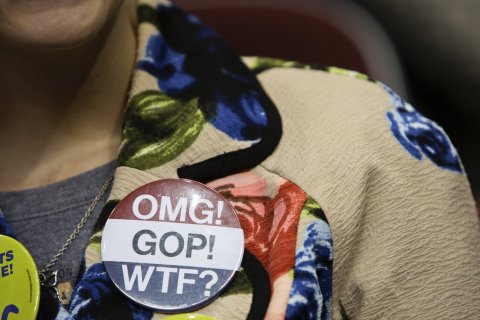
Even though the problem was largely imaginary, there was an easy solution in the Help America Vote Act signed by President Bush in 2002. Those who registered to vote by mail had to produce identification the first time they showed up to cast a ballot. Acceptable forms were a valid photo identification like a driver's license, passport or student ID, as well as more easily obtained records, such as a copy of a current utility bill, bank statement, government check, paycheck or other government document with the name and address of the voter. Anyone who presented such an ID when registering didn't have to produce it when voting.
To illegally obtain such a record would require a conspiracy between two people for the purpose of casting a single ballot. The improbability of such a scenario—coupled with the reality that there was more evidence for the existence of Bigfoot than for any consequential in-person voter fraud—should have put the issue to rest. But Republican-led legislatures instead toughened the rules, creating a far narrower category of acceptable identifications that no honest person could see as anything other than an attempt to disenfranchise voters.
Utility bills, paychecks and the like were tossed out. Several states imposed rules that people had to produce proof of citizenship—passport, birth certificate or naturalization papers—to register. Michael Waldman, president of the Brennan Center, reports in his powerful new book, The Fight to Vote, that 7 percent of eligible voters and 12 percent of the poor do not have such documents, and that one out of three women do not have proof of citizenship with their married name.
Then there were the restrictions at the voting booth. In Texas, IDs for students—who are more likely to vote for Democrats—were rejected, while gun licenses—which are held by people more likely to vote for Republicans—were deemed acceptable. According to Waldman, of the 11 states with the largest turnout among African-Americans, seven made it harder to vote; nine of the 12 states with large Hispanic populations did the same.
The ID requirements matter because they hit hardest on the poor, according to Waldman. About 11 percent of eligible voters do not have current driver's licenses or other IDs acceptable under the new laws. A large portion of those are poor. African-Americans were one-third as likely to have a photo ID as whites. And while Republicans proclaimed that citizens could obtain free IDs, they could only do so by locating or buying copies of birth certificates, marriage licenses and citizenship papers.
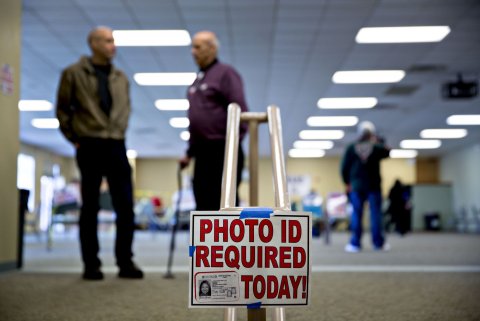
This was no mistake. Masset, the former political director of the Texas Republican Party, said he believed photo ID requirements would impede enough Democrats from voting to give the Republicans a 3 percent advantage. Before the 2012 election, Pennsylvania Republican House Leader Mike Turzai declared that the state's voter identification law would "allow Governor Romney to win the state of Pennsylvania." (It didn't.)
Experts described the reality of these tougher rules—and the reasons behind them—in stark terms. "In a democracy, reducing access to the ballot is difficult to justify,'' Minnite wrote in a 2014 report. "Political motives and strategies to discourage voting by particular groups such as racial minorities cannot be openly announced.… Mythical threats that stoke social prejudices are used to make new restrictions seem reasonable."
So it's no surprise that efforts to solve the problem get quashed. Governor Scott Walker (R-Wis.) just signed a law that prevents towns and counties from issuing photo IDs that could be used to facilitate voting; advocates of the law say it is intended to reduce fraud—somehow.
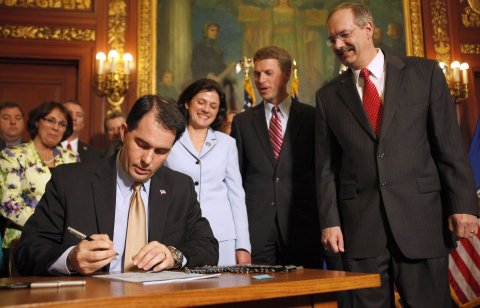
Republicans haven't stopped there; it is difficult to find a single rule that aids minorities and other Democratic constituencies in voting that hasn't been attacked, changed or undermined by GOP-led states. In 2011, Florida imposed restrictions to prevent third-party organizations from registering people to vote that were so onerous (including provisions that would jail members of those groups if they failed to comply with broad provisions in legal paperwork) that the League of Women Voters stopped signing up new voters in the state out of fear of being dragged into criminal court. (Recently, when a bill passed the Legislature with a veto-proof majority allowing for online registration, Governor Rick Scott, a critic of the legislation, signed it into law.) Early voting, which has been shown to increase minorities' participation in elections, has been cut back drastically in that state. Why? A 2012 report in The Palm Beach Post quoted former Republican officeholders and strategists who said that once the party realized how many Democratic voters were turning up at the polls because of early voting schedules, GOP legislators wrote legislation to cut them back. In particular, they wanted to limit Sunday voting, which is used by black churches to organize buses and carpools to bring parishioners to the polls. "I know that the cutting out of the Sunday before Election Day was one of their targets only because that's a big day when the black churches organize themselves," one GOP consultant told the Post.
Indeed, Republicans have made it clear that erecting hurdles to make voting more difficult is their goal. For example, Governor Pat McCrory of North Carolina said in April that being allowed access to the voting booth should be as difficult as purchasing the main ingredient for making meth.
But the true modern-day Juan Peróns are two Republican secretaries of state, Kris Kobach of Kansas and John Husted of Ohio. In 2014, Husted issued rules for primary and general elections that excluded early voting hours for the Sunday immediately preceding Election Day. The schedule for early voting allowed by Husted was so convoluted it took a court 10 lines of type in a paragraph to describe them. A federal court knocked down the attempt, so Husted tried again with new restrictive rules. Once again, he eliminated those times when black voters historically showed up in the largest numbers. Barred by permanent injunction from stopping voting on the Sunday before the election, Husted did the next best thing: He shut down the polls on every other Sunday. He also eliminated something called the Golden Week, when a citizen could register to vote and cast a ballot on the same day.
Doug Preisse, the chairman of the Franklin County Republican Party, said at the time in an email to The Columbus Dispatch, "I guess I really actually feel we shouldn't contort the voting process to accommodate the urban—read African-American—voter turnout machine."
U.S. District Senior Judge Peter C. Economus found that Husted's rules burdened "the right to vote of certain groups of voters"—specifically, minorities and the poor. Husted appealed the case but kept losing; eventually, he settled with an agreement that allowed for uniform early voting.
But Kobach (who publicly stated he believed Obama might try to stop all prosecutions of black people) is the king of voter suppression. He set a rule in 2013 that those who attempted to register but didn't show proof of citizenship—not at the polls but at registration—would not have their application processed, placing them in limbo. That led to 37,000 Kansas residents having their voting rights placed in suspension; a study found that more than half of those people had followed the rules and had no reason to be on the list. (Kobach went further last year with a rule declaring that all of those people could be purged from the system after 90 days.)
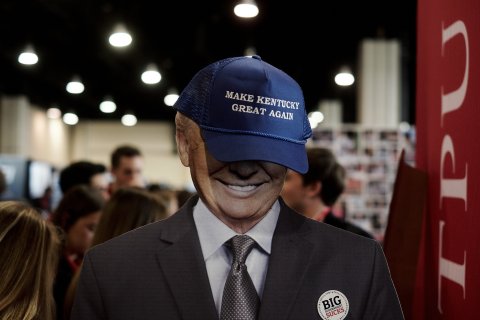
Following a U.S. Supreme Court ruling in June 2013 that states could not impose a documentary proof-of-citizenship requirement for those who register to vote using the federal form, Kobach created a two-tiered system where those who register under rules established by Washington would be allowed to vote only in national elections; to prevent fraud, Kobach said, those same Kansans would not be permitted to vote in state or local races without registering again. The two-tiered system was struck down in court earlier this year, with the judge slamming Kobach for creating a system with elements that would place secret ballots at risk of disclosure.
In 2014, Kobach accused the local United States attorney of refusing to prosecute cases of voter fraud he had referred for federal prosecution. Last year, it emerged that he made up the allegation—he had not referred any such cases. But the ruse worked: By then, he had been given powers to prosecute voting fraud—the only secretary of state in the nation to have that power—and proclaimed he had found more than 100 violations; only six people have been indicted and one convicted. None of the cases emerged from actions that would have been stopped by voter ID rules, and critics say almost all of the cases seem to stem from people making mistakes. For his part, Kobach says that his crusade is only meant to guarantee that legitimate voters don't have their choices canceled out by others impersonating citizens or other people at the ballot box—a scenario he has yet to prove has ever occurred in his state.
With so many Kansans being impeded from voting by a man obsessed with an almost nonexistent crime, the American Civil Liberties Union and the League of Women Voters filed suit on behalf of the state's voters. In response, Kobach declared that the league—a renowned civic organization that has been so respected it was selected to host the 1976, 1980 and 1984 presidential debates—was a bunch of "Communists."
No, Mr. Kobach. Communists work to undermine elections. Patriots fight for democracy, which means doing everything possible to encourage citizens to vote.
The disdain for the electorate has become ingrained in the American political system, and so long as one side or the other can find an advantage to advance its personal beliefs and crusades, rather than championing ways for everyone to vote, the country will continue to slide in the quality of its democracy.
Of course, it's easy to persuade partisans that it takes fraud for their strongly held political beliefs to be rejected in an election. In an era in which cable networks, websites and books relentlessly preach the refrain "you're right, and those who disagree are evil," it's hardly a leap for someone to believe that when the evil side wins, it cheated. Few rabid Democrats or Republicans will ever accept that a majority of the voters just don't agree with them.
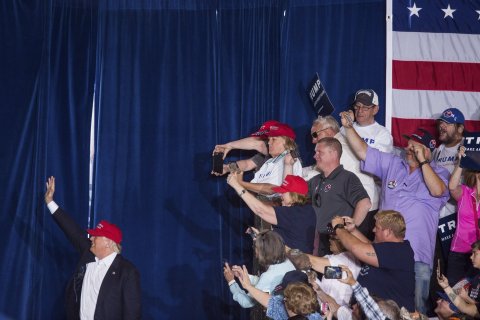
The truth is, each side will lose sometimes. It's the nature of democracy. And for those who can't accept that, who want to manipulate the rules, or make voting as hard as buying the ingredients for illegal drugs, or metaphorically stand with a bat in the doorway of the polling place, it's time to stop citing James Madison, Susan B. Anthony and Martin Luther King Jr. as the personifications of America's greatness. Instead, accept that your philosophical hero is actually Kim Jong Un, the supreme leader of North Korea, whose political goals are never overruled by a pesky electorate.



